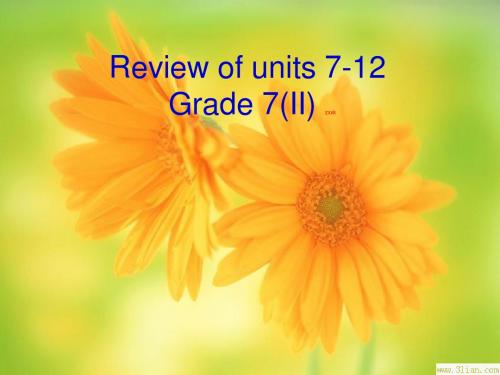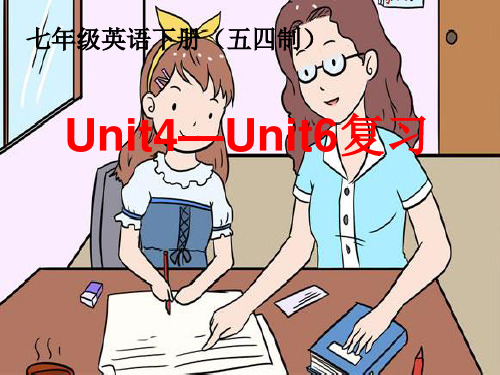七年级英语下册复习课件
合集下载
七年级英语下册 module 7 my past life复习课件

第十一页,共二十页。
• unit1对话翻译: 1我出生在一个小山村
• 托尼:喂,2玲玲,你出生在哪里? • 玲玲:3我出生在山西省的一个小山村。
• 托尼:4那个村子叫什么名字? • 玲玲:徐村。你出生在哪里,托尼? • 托尼:5我出生在剑桥。6它是英国的一个小城市。
• 玲玲:7你上的第一所学校叫什么名字?
bored/boring
• 12friendly(反义词)--
unfriendly
2021/12/12
第三页,共二十页。
• Unit1短语 • 1过去的生活 • 2我的过去的生活
past life my past life
• 3出生于
be born
• 4在一个小村子里
in a small village
3 )They were born in Beijing in 2001. (提问)When was Tom born?
பைடு நூலகம்
When and where were they born?
2021/12/12
第十页,共二十页。
• 三、写出下列(xiàliè)人称对应的be动词过去式:
• he
you
she
it
the .eg:1.I was the first to come to school this moring.2.Who was your/Lucy's first teacher?
• 五、difficult:难的,难管理的,难相处的。
• 六、对...友好:be friendly to sb.注意:宾格及介词to. • 七、提问某人性格用:What be sb like?外貌用:What do /does sb look
人教版七年级英语下册Unit3_复习公开课课件

How _d_o_e_s__ he/she get to school? He/she _t_a_k_e_s the subway to school.
_g_e_t_s to school by subway. How__d_o_ they get to school?
_T_h_e_y_ walk to school get to school __o_n___ _f_o_o_t__.
B: It’s about 115 kilometers from his home to school
It’s about 20 minutes’ bike ride, half an hour’s bus
ride and 40 minutes’ subway ride.
How about you? Let’s talk!
It’s about 10 kilometers.
How long does it take?
It takes 15 minutes to take a bus.
take the subway 10 kilometers 25minutes
How does Susan go to work?
She goes to work by subway.
First, she walks to the bus stop. Next, she takes a bus to the subway station.
Then, she takes the subway to the bus stop. Next, she takes a bus the stop near home. Finally, she walks to the school.
_g_e_t_s to school by subway. How__d_o_ they get to school?
_T_h_e_y_ walk to school get to school __o_n___ _f_o_o_t__.
B: It’s about 115 kilometers from his home to school
It’s about 20 minutes’ bike ride, half an hour’s bus
ride and 40 minutes’ subway ride.
How about you? Let’s talk!
It’s about 10 kilometers.
How long does it take?
It takes 15 minutes to take a bus.
take the subway 10 kilometers 25minutes
How does Susan go to work?
She goes to work by subway.
First, she walks to the bus stop. Next, she takes a bus to the subway station.
Then, she takes the subway to the bus stop. Next, she takes a bus the stop near home. Finally, she walks to the school.
Unit 9 单元复习知识点课件 人教版英语七年级下册

-- _________.
A. He is thin
B. She is a kind girl
C. She likes music D. She has good-looking
4. -- Lucy doesn’t have curly hair.
-- Yes, we can say she has _______hair.
There are a lot of people in the bus. 公共汽车上有很多人。
3. Also, they don’t always remember well. 而且,他们并不总是记得牢靠。
(1)当also用于句首时,其后往往有逗号与句 子的剩余部分隔开。这时,also用于修饰整 个句子,相当于汉语中“同时;还;而且”。
Unit 9 What does he look like?
单元复习知识点课件
Key sentences for describing people: (描述人的重点句型)
What does he/she look like? 1) He/She is of medium height/tall/short
A. How old is he
B. What does he do
C. What does he look like D. How is he
8. --Tom is not very heavy.
--Yes, I think we can say he is ______ heavy.
A. a little
Ⅰ.补全句子。
1. 他长得什么样?
_W___h_a_t_ __d_o_e_s__ he ___lo_o__k_ __l_ik__e__?
七年级下册英语仁爱版期末全册复习课件PPT

Don’t read after me.
二、话题
1.天气及季节 2.学校生活〔交通〕 3.居住环境 4.生日
三、句型 〔及交际用语〕
1.某人用多长时间/多少钱做某事: It takes/took sb. + 时间/钱 + to do sth.
2. 提问时间:
What’s the time?
What time is it?
一、重点语法
1.动词时态 2.祈使句
动词时态
名称
特征词
肯定句的动词
一般现在 sometimes, usually, often always, every...,
现在进行 look, listen, now,
It’s ...〔几点了〕 . 后的
句子
原形 第三人称单数
be + doing
Don’t do sth. 后的句子 一般过去 yesterday..., just now,
7.提问温度:
What’s the temperature? How about the temperature?
8. 提问人的相貌:
What does...look like?
9. 提问人的性格:
What is ... like?
10.询问对方情况:
What’s wrong with sb.? What’s the matter with sb.?
...ago, this morning,
过去式
When I was young,
1.The twins ___w__a_s_h____〔wash〕 the
clothes every day.
2.Sometimes he __p_l_a_y__s_ 〔play〕
二、话题
1.天气及季节 2.学校生活〔交通〕 3.居住环境 4.生日
三、句型 〔及交际用语〕
1.某人用多长时间/多少钱做某事: It takes/took sb. + 时间/钱 + to do sth.
2. 提问时间:
What’s the time?
What time is it?
一、重点语法
1.动词时态 2.祈使句
动词时态
名称
特征词
肯定句的动词
一般现在 sometimes, usually, often always, every...,
现在进行 look, listen, now,
It’s ...〔几点了〕 . 后的
句子
原形 第三人称单数
be + doing
Don’t do sth. 后的句子 一般过去 yesterday..., just now,
7.提问温度:
What’s the temperature? How about the temperature?
8. 提问人的相貌:
What does...look like?
9. 提问人的性格:
What is ... like?
10.询问对方情况:
What’s wrong with sb.? What’s the matter with sb.?
...ago, this morning,
过去式
When I was young,
1.The twins ___w__a_s_h____〔wash〕 the
clothes every day.
2.Sometimes he __p_l_a_y__s_ 〔play〕
人教版七年级英语下册复习课件Unit2 What time do you go to school(24张PPT)

Activity get up
7:30
have breakfast
8:00--11:00 12:00
14:00--17:00
do homework have lunch play football with friends
18:00
have supper
19:00--21:00 21:30
watch TV at home go to bed
work 是
,表示“工作,劳动”,抽象概念。
指日常生活工作中各类体力脑力劳动。也可作动词。
go to work after work
eg : He found a job in Beijing.
He has a lot of work to do every day.
My father works in a hospital.
It’s nine fourtryt.y.
I go to school at seven o’clock.
我在七点钟去上学。
go to school
去上学
at seven o’clock
在七点钟
at + 时间点 :在....... (点)
I go to school at seven o’clock. (对划线部分提问)
逆读法: 借助介词past或to 。 (1) 分钟数为30, ….点半:
6:30 half past six 5:30 half past five (2) 分钟数不到30, …点过…分: 6:05 five past six 6:10 ten past six 6:15 a quarter past six (3)分钟数超过30, 差…分…点:(60— 分钟)+to+(小时+1) 6:45 a quarter to seven 6:50 ten to seven
七年级英语下册 Units 7-12 复习课件

1. Spring Festival is in _________ January or _________. February
March 12th 2. Tree Planting Day (植树节)is on ____________.
th month of the year. ________is the fifth/5 May June ________is the sixth/6th month of the year. July ________is the seventh/7th month of the year.
August _________is the eighth/8th month of the year. September is the ___________ month of the year. ninth/9th tenth/10th October is the _______month of the year. th eleventh/11 November is the _____________month of the year. th twelfth/12 December is the _____________month of the year.
4、你吃多少米饭? How much rice do you eat?
z.x.x.k
购物用语 Clerk: Can I help you?/ What can I do for you? We have sweaters in many color. What color do you want? Here you are.//You’re welcome. That’s all right./That’s OK./Not at all. Customer: Yes, please. I want/would like a/an…. I’m looking for …. How much is it?/How much are they? What’s the price of …? I’ll take it/them. Here’s the money. Thank you very much/ Thanks a lot.
七年级英语下册Unit4~Unit6 复习课件

/_r_e_ce_i_v_e_a__le_t.ter from sb 14. 用……覆盖.…_c_o_v_e_r_…_w__it_h; 被……覆盖 b_e_c_o_v_e_r_e_d_w_.ith 15.按通(电流、煤气、水等);打开____tu_r_n_o_n__; 关闭__t_u_rn__o_f_f __; 调高___t_u_rn__u_p__; 调低 拒绝(请求、劝告等) __t_u_rn__d_o_w_n_.
三、核心句子
ቤተ መጻሕፍቲ ባይዱ
重点句型
1.It_i_s_t_h_e__d_u_t_y_o_f_d_o__c_to_r_s_t_o__s_a_v_e_t_h_e__lives of patients
拯救病人的生命是医生的职责
2.It’s best not __n_o_t_t_o__ru_n__a_w__a_y_f_ro__m___ our problems
语法突破
C.祈使句+ and(or)+ 陈述句 和if 条件状语从句的转换。 1)早点起床,否则你会迟到。 Get up early, ___ you’ll be late. = ___ you ___ get up early , you’ll be late. 2)努力学习你就会通过考试。 Study hard and you ___ pass the exam. =____you study hard, you ___ pass the exam.
重点短语
1.__c_u_t _u_p____切碎, _c_u_t_o_f_f ____切断;中断;使死亡;剥夺继承权 _c_u_t_d_o_w_n___v. 削减;砍倒;杀死 _c_u_t_o_u_t____ 切断;删去;停止;关掉
三、核心句子
ቤተ መጻሕፍቲ ባይዱ
重点句型
1.It_i_s_t_h_e__d_u_t_y_o_f_d_o__c_to_r_s_t_o__s_a_v_e_t_h_e__lives of patients
拯救病人的生命是医生的职责
2.It’s best not __n_o_t_t_o__ru_n__a_w__a_y_f_ro__m___ our problems
语法突破
C.祈使句+ and(or)+ 陈述句 和if 条件状语从句的转换。 1)早点起床,否则你会迟到。 Get up early, ___ you’ll be late. = ___ you ___ get up early , you’ll be late. 2)努力学习你就会通过考试。 Study hard and you ___ pass the exam. =____you study hard, you ___ pass the exam.
重点短语
1.__c_u_t _u_p____切碎, _c_u_t_o_f_f ____切断;中断;使死亡;剥夺继承权 _c_u_t_d_o_w_n___v. 削减;砍倒;杀死 _c_u_t_o_u_t____ 切断;删去;停止;关掉
人教版七年级英语下册Unit4复习课件

—Do my homework, of course.
A. What
B. When
C. Where D. How
4. —
late for school again.
—Sorry, I won’t.
A. Not be B. Don’t be C. Not D. Don’t
5. Which of the following pictures means“Please be quiet”?
【用法辨析】listen与hear的区别
【活学活用】
Байду номын сангаас
①听! 你能听见汤姆正在唱歌吗?
! Can you
Tom singing now?
②不要在会上听收音机。
Don’t
the radio in the meeting.
答案: ①Listen; hear ②listen to
4. We can’t wear a hat in our school. 在我们学校里不允许戴帽子。 【自主领悟】wear“穿; 戴”, 表示状态。相当于be in。例如: He is wearing a black T-shirt. 他穿着一件黑色的T恤衫。
【归纳拓展】before的其他用法
【活学活用】
①She always says goodbye to her mother before
(go)to school.
②He always washes his feet
he goes to bed.
A. after
B. because
C. if
D. before
his workers and he is
also strict
- 1、下载文档前请自行甄别文档内容的完整性,平台不提供额外的编辑、内容补充、找答案等附加服务。
- 2、"仅部分预览"的文档,不可在线预览部分如存在完整性等问题,可反馈申请退款(可完整预览的文档不适用该条件!)。
- 3、如文档侵犯您的权益,请联系客服反馈,我们会尽快为您处理(人工客服工作时间:9:00-18:30)。
母亲的温度正在消失。在村庄没有拆迁之前,虽说母亲己经去逝多年,但她生前留给我的两间瓦房,却像一个符号,镌刻在那片土地,存留在我的心底。每次回去,只要站于那两间近于破败的房屋 前,母亲的身影便会出现在眼前。活灵灵的,似梦非梦,似幻非幻,和生前没有什么两样。老屋的窗前,走廊都在辐射着母亲的体温,温馨,亲切。因为,母亲的魂就住在这里。如今,本己荒芜的小院 到处散落着残砖碎瓦,老屋也变成了一堆瓦砾。院内稍大些的树己被变卖,留下一处处土坑,新鲜的土看上去特别剌眼。容留母亲灵魂的老屋不在了,母亲的魂,不知道又要飘零到哪里去了。
这里,原本只是我一个人的故乡。从现在开始,左邻右居也要将这里变成他们的故乡了。看着眼前一堆堆依旧残留着炊香的瓦砾,我隐隐地感觉,故乡己经渐行渐远了。或许,明天,小新集这个名 字也将不复存在。或许,若干年后,连这个村庄的曾经存在都不再会被人记起。
从此刻开始,家乡的温度正在慢慢消失。raybet雷电竞下载 wwwຫໍສະໝຸດ
这,仍然要缘于那条沙河。
因为有了这条河,建成了湿地公园,使沿河两岸变成了小桥流水、树木葳蕤的风景处。后来,因为一个汽车宿营地的项目,村庄用地又被征用,村民们全部搬迁……居住的环境变好了,而祖祖辈辈 栖息在这里的乡亲们,却成了他乡人。
这里,原本只是我一个人的故乡。从现在开始,左邻右居也要将这里变成他们的故乡了。看着眼前一堆堆依旧残留着炊香的瓦砾,我隐隐地感觉,故乡己经渐行渐远了。或许,明天,小新集这个名 字也将不复存在。或许,若干年后,连这个村庄的曾经存在都不再会被人记起。
从此刻开始,家乡的温度正在慢慢消失。raybet雷电竞下载 wwwຫໍສະໝຸດ
这,仍然要缘于那条沙河。
因为有了这条河,建成了湿地公园,使沿河两岸变成了小桥流水、树木葳蕤的风景处。后来,因为一个汽车宿营地的项目,村庄用地又被征用,村民们全部搬迁……居住的环境变好了,而祖祖辈辈 栖息在这里的乡亲们,却成了他乡人。
